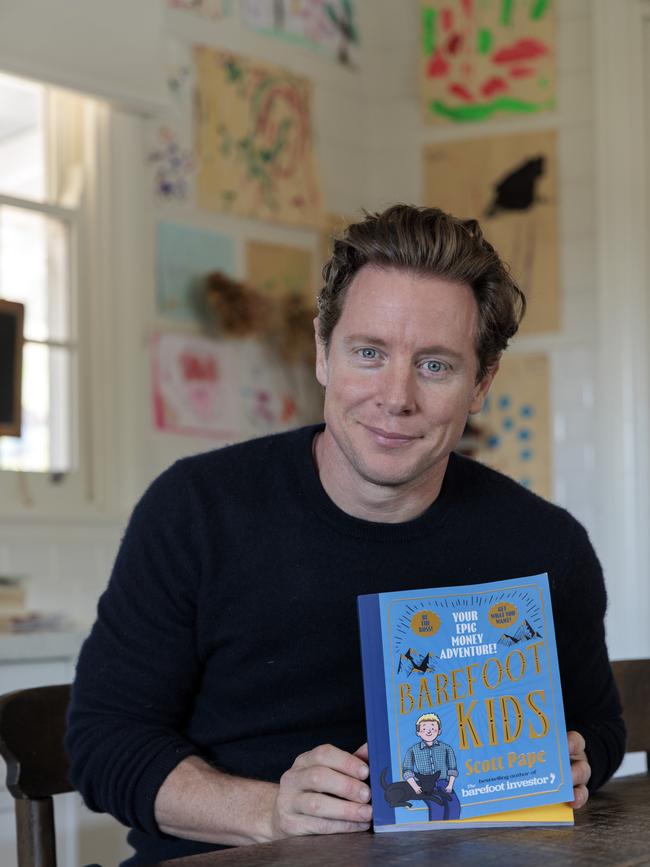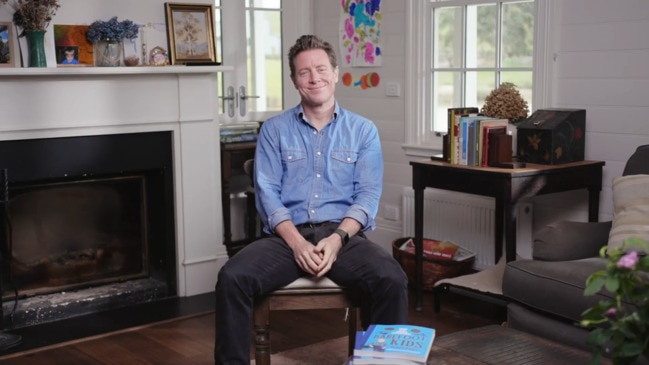Scott Pape shares tips to help children earn and grow money
A new book by the Barefoot Investor mixes inspirational stories of children’s financial successes with practical money tips.

SmartDaily
Don't miss out on the headlines from SmartDaily. Followed categories will be added to My News.
Barefoot Investor Scott Pape says his new book for children had a tough editing team.
“I would spend all day toiling away at the keyboard writing what I think was really good, and then at night I would sit down with the four harshest editors I’ve had in my life – my four kids aged nine, seven, four and two,” he says.
“Within about a minute they would be wriggling, not paying any attention, and my son – who’s nine and an avid reader – said to me one day ‘you know what you’re doing here, you’re using humour as a tool to engage the reader, but what you’re really doing is wasting people’s time – you need to get to the point’.
“So I thought it needs to be kids learning from other kids.”
That’s why Pape’s book Barefoot Kids is packed with stories and advice from junior money successes, plus plenty of tips from Pape himself.
He devotes a key section to making people smile, feeling good about assisting others, and helping to make the world a kinder place.

“Talking to kids about money can feel really icky, it can feel very consumerist, very capitalist – but to me money is just a way to teach kids values and behaviours,” he says.
“No one wants a kid to be an entitled brat.
“The way that you get around that is you get them to work, and it’s good to give. The happiest, most content people that I know are the ones who give, not the tightwads who clench their money and won’t share it with anyone.
“For me, money is about sharing, making someone smile. It’s not about being the richest person around – it’s about using money in a way that brings you happiness. If that doesn’t involve someone other than yourself, you’re going to be a very unhappy person.”
Here’s a taste of the other wisdom within the book’s 220-plus pages.
1. TAKE CHARGE OF POCKET MONEY
Pape says children can train parents to pay pocket money by being proactive about offering to work for cash for tasks including laundry, unpacking groceries, emptying bins and cleaning cars.
He says pocket money should not be paid for basic household tasks, which he calls parent pleasers that “sweeten the deal” when negotiating other jobs.
“You shouldn’t expect to be paid to set the tables, clear the dishes, put your smelly socks in the laundry – these are things you should be doing because you’re part of the family.”
2. USE MONEY BUCKETS
Pape shares the buckets strategy he recommends for adults, dividing money into “buckets” labelled splurge, save, give and grow.
“Money buckets are just a simple way to think about where your money goes. Instead of an actual bucket, you’re going to keep your money in jars, or envelopes or perhaps a bank account,” he writes.
3. START A BUSINESS
Pape profiles 50 children aged between five and 15 who have created their own business – including collecting bottle, lawn mowing and making dog biscuits – to serve as an inspiration for other children to imitate.
“Kids can say “I can actually do that’ and earn their money … stop looking for a handout,” he says.
4. SHOP SECOND-HAND
“Good as new is better than new,” Pape writes.
“You can buy the exact same thing for practically nothing after someone else has done the unwrapping for you.”
5. USE INVESTMENT APPS
“When I was growing up it was a lot harder to grow shares,” Pape says.
“There was a minimum of $500 and you had to sign up with a stockbroker. It was so complicated.
“These days kids can set up their own investment apps – they don’t even have to know what a broker is. They can download it and start investing with under $50 – in many cases you can do it with $5.”
“The earlier you do it, the better it becomes.”

6. UNDERSTAND COMPOUND INTEREST
“The longer you leave your money in your grow bucket, the more it grows,” Pape writes.
“When you learn how to grow your money you’ll never be broke. And you’ll always be able to help out your family and friends if they hit hard times.”
7. HAVE A BUSINESS PLAN
“It’s great to have an exciting idea, but it pays to prepare and think things through,” the book says.
Before starting a money-making venture, children should get their parents’ approval, make a list of people who can help them get started, decide on the product they are selling, then work out prices, promotions and business premises.
8. LEARN FROM OTHERS
Pape’s profiles of young “Barefoot Bosses” ask each child how much money their idea delivers, and whether they think it is easy or hard for other kids to do.
It recommends readers dog-ear the business stories they like, then decide what ones they may be able to do themselves.
9. DEVELOP COMMUNICATION SKILLS
Talking to people gets easier the more you practice, Pape writes.
The first thing is to smile, followed by eye contact to show the person you’re paying attention, then ask questions to get them talking.
10. INVEST FOR THE LONG TERM
Pape says the longer you leave shares invested, the bigger they grow: “it takes 10 years to grow a decent-sized apple tree. Why would you want to chop it down early?
“I like to own all the biggest shares in Australia and around the world — in one swipe of an investing app. The fancy name for this is an index fund, and it’s the best place to grow your money. Most investing apps only offer index funds.”
More Coverage
Originally published as Scott Pape shares tips to help children earn and grow money





